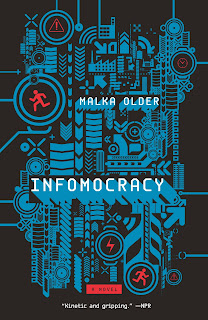"Ken runs through his destinations in his mind. 'Hard to sell in Java, though they might scrape a centenal or two together on that basis. But Liberty's pretty weak there; PhilipMorris is the big corporate to worry about. Singapore and Taiwan -- yeah, an anti-Japan message could still resonate. But war?'"
Malka Older is a faculty member at Arizona State University and has worked for various humanitarian causes. Her Wikipedia page reads a bit like her resume, and I'm a little suspicious of it. Infomocracy, the novel reviewed here, is part of her "Centenal Cycle," a trilogy exploring the politics of the future.
Infomocracy is set in the near future, decades after global warming has caused the seas to rise and the nation-states of the present day to fall from favor. In the wake of such upheavals the world's population has been redistributed across the surface of the globe, and this population has been divided into territorial units called "centenals." Each centenal is administered by an elected government, and each elected government represents a political party which spans the planet, and which seeks to achieve a supermajority over other parties by winning enough centenals to influence policy on a global scale.
Which is where our heroes enter into the picture. There's Ken, who campaigns for Policy1st, one of the political parties, Mishima, an agent working for Information, the future equivalent of Google, and Domaine, an ill-defined figure who's trying to bring an end to the political system altogether. On the eve of the 10-year global elections evidence of tampering with the voting system emerges, a conspiracy seems evident, and Ken, Mishima and Domaine must contend with the machinations of more powerful groups and individuals.
Sounds not bad, right? Just be aware that my description of the books' premise is clearer than anything in the book itself. It took me 380 pages to arrive at that description, and beyond that I have retained little from this novel. What happened before, during and after the events described above? People mostly float around in aircraft known as "crows," stay at hotels, compile information and piece things together in the most arbitrary fashion.
Oh, and there are the hilarious ninja battles involving a mix of flamethrowers and antique weaponry, apparently necessitated by the obsolescence of firearms. People fight with swords and throwing stars inside office buildings -- they even go "Hiiiya!" when it suits them. These parts of the book read like something Frank Miller would have dreamed up in the 80s, with the exception that Frank Miller would have framed the ninja battles within a much cooler, much better thought out story.
Overall this book reminded me of William Gibson, but again, William Gibson would have placed what passes for a plot in Infomocracy into a larger context, supplying much-needed reasons for what's happening and why. As it is, Infomocracy has all the zest of millennials working at Google or campaigning for Joe Biden. It's the story of disconnected people who just aren't that interesting, struggling to preserve a system that seems as open to abuse as the order of things it replaced. What happened in this book, really? To whom? And why should anyone care? In the end you can only shake your head at it, and wonder at the author's ability to pile word upon word with so little effect.
Related Entries:

沒有留言:
張貼留言